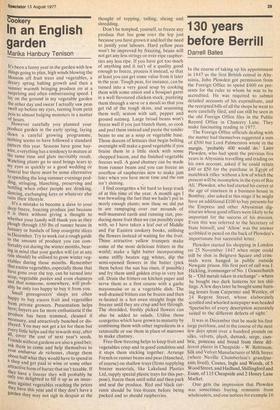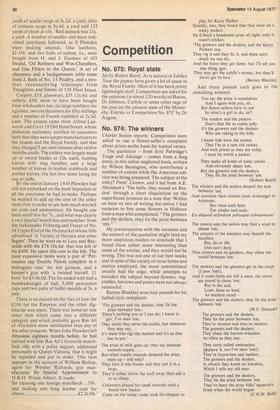130 years before Berrill
Darrell Bates
In the course of taking up his appointment in 1847 as the first British consul in Abyssinia, John Plowden got permission from the Foreign Office to spend £400 on presents for the ruler to whom he was to be accredited. He was required to submit detailed accounts of his expenditure, and the receipted bills of all the shops he went to were carefully filed, and can still be seen in the old Foreign Office files in the Public Record Office in Chancery Lane. They make fascinating reading in 1977.
The Foreign Office officials dealing with the matter had themselves suggested a sum of £500 but Lord Palmerston wrote in the margin, 'probably 400 would do.' Later Plowden, who had spent the previous five years in Abyssinia travelling and trading on his own account, asked if he could retain £40 or £50 for the purchase in Egypt of matchlock rifles 'without a few of which the present will be incomplete in the eyes of Ras Ali.' Plowden, who had started his career at the age of nineteen in a business house in Bombay, also asked at this stage if he might have an additional £100 to buy presents for the Empress and other Abyssinian dignitaries whose good offices were likely to be important for the success of his mission. Even this was referred to the Secretary of State himself, and 'Allow' was the answer scribbled in pencil on the back of Plowden's importunate but successful letter.
Plowden started his shopping in London on 25 November 1847 when snipe could still be shot in Belgrave Square and criminals were hanged in public outside Newgate prison. His first port of call was J. Hickling, ironmonger of No. 1 Gracechurch St — 'Old metals taken in exchange' — where he bought two dark lanterns for ten shillings. A few days later he bought some burning lenses from Carpenter and Westley, of 24 Regent Street, whose elaborately scrolled and whorled notepaper was headed 'Spectacles of every description accurately suited to the different defects of sight.'
It was in December that he made his first large purchase, and in the course of the next few days spent over a hundred pounds on silks, velvets, plush, damask, serge, cambric, ponceau and broad from three different places in Cheapside — W. Robinson, Silk and Velvet Manufacturer of Milk Street (where Neville Chamberlain's grandparents lived), Coates, Ingle and Woods, of 5 Wood Street, and Hadland, Shillingford and Esam, of 115 Cheapside and 2 Honey Lane Market.
One gets the impression that Plowden was sometimes buying remnants from wholesalers, and one notices for example 10 yards of scarlet serge at 3s.2d. a yard, ditto of crimson serge at 3s.4d. a yard and 12i yards of plush at 10s.. Red damask was 21s. a yard. A number of smaller and more individual purchases followed, as if Plowden were making amends. One lanthorn, £1.10s. and two balls of cotton, is., were bought from H. and J. Gardner of 453 Strand, 'Oil Refiners and Wax-Chandlers, and Gas Fitters to the Queen.' A set of chessmen and a backgammon table came from J. Bath of No. 14 Poultry, and a twofoot reconnoitring telescope from Troughton and Simms of 138 Fleet Street.
Carpets, £18, glassware, £35.12s.6d. and cutlery, £60, seem to have been bought from wholesalers too, six large tumblers for a guinea, two cut decanters for fifty shillings and a number of French tumblers at 2s.3d. each. The carpets came from Alfred Lapworth and Co of 19 Old Bond Street, whose elaborate stationery notified its customers both that they were carpet manufacturers to the Queen and the Royal Family, and that they charged 5 per cent interest after twelve months credit. The cutlery was largely made up of sword blades at 10s. each, hunting knives with stag handles, and a large number of knives in leather scabbards and pocket knives, the last two items being for use at table.
By the end of January 1848 Plowden had still not embarked on the most important of all the purchases he had to make. Perhaps he wanted to add up the cost of the other items first in order to see how much was left for arms and ammunition. He bought one more snuff box for 7s., and what was clearly a very special 'match box and matches' from the fashionable Fribourg and Freyer of No. 34 Upper End of the Haymarket whose bills advertised 'A Variety of Havana and other Segars'. Then he went on to Lacy and Reynolds with the £78.10s.6d, that was left of his £400. He spent this sum to the hilt. The most expensive items were a pair of 'Percussion cap Double Pistols complete in a mahogany case' for ten guineas, and a keeper's gun with 'a twisted barrel), 11 bore' for £4.0s,Od. The list ended with half a hundredweight of ball, 5,000 percussion caps and two pairs of bullet moulds at 3s, a pair.
There is no record on the files of how the £100 for the Empress and the other dignitaries was spent. There was however one other item which came into a different category and which probably gave Ras All of Abyssinia more satisfaction than any of the other presents. When John Plowden left Abyssinia eighteen months before, he had carried with him Ras All's favourite matchlock rifle with a polite request, addressed personally to Queen Victoria, that it might be repaired and put in order. This item appears in the account of William Bishop, agent for Westley Richards, gun manufacturer By Special Appointment to H.R.H. Prince Albert. It reads: 'for cleaning one foreign matchlock ....10s. and making one long leather case for above £2.2s.0d.'



































 Previous page
Previous page